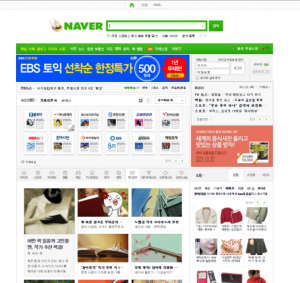Google is commonly known as the global search engine leader but there are many markets where it struggles to gain any form of foothold; Russia, Japan, China, the list is endless.
One country which joins the league of local search engine giants is South Korea. Its biggest player is Naver, with over 49.75% of the market; it secures a larger share than what Google retains in the US. With a population of more than 50 million and an 84.1% internet penetration rate, the country has the seventh-biggest retail e-commerce market worldwide.
In addition, retail e-commerce sales in South Korea are expected to reach $36.76 billion in 2015, according to the latest eMarketer estimates. These figures give South Korea the third-largest retail e-commerce market in Asia-Pacific, after China and Japan.
Google vs Naver
Naver’s founders realized early on that when you searched in Korean on Google, there was hardly anything to be found for local results. So, they set out to create a service that would find quality content for South Koreans that is relevant to the market’s needs.
South Korea has been consistently slipping out of Google’s grip. With Naver, beating Google as the most popular search engine in South Korea, leaving Google with a market share of 36.9%.
Naver’s page layout is much busier than Google; with lots of images, flash banners and sections. Although this may look far too cluttered for Western eyes, a site like Google looks far too empty to South Korean consumers. Wayne Lee, an analyst at Woori Investment and Securities, states: “No matter how powerful Google’s search engine may be, it doesn’t have enough Korean-language data to trawl to satisfy South Korean customers.”
Unlike Google’s page layout – which has a simple search box – Naver displays the most frequently searched keywords or topics in the past hour. The Naver homepage provides insights and trends into what people are searching for and talking about in the South Korean market.
“Naver also gives a comprehensive and interactive search experience by generating search results from each service category in one page. This includes ads, news articles, report blogs, knowledge searches and a Naver e-commerce comparator”, states Mandy Shin of L’atelier.net.
She continues “when you search for an item on Naver, it will present the most frequently used related keywords. For example, if you search for ‘iPhone’, you will see related search words such as ‘iPhone 6’, ‘iPhone sale’, ‘iPhone damage’. This in turn increases the user’s browsing time on the portal.
More importantly, Naver, provides relevant information tailored for South Korean users, who want a localized service. It has been reported that South Korean search engines (Naver, Daum, Nate) perform better due to a difference in the cultural attitudes of the searcher. MVF Global Customer Acquisition notes that: “All of the South Korean search engines appear more like portals and the homepages have a combination of images and user generated content, which suggest South Koreans prefer more than search. It appears that in the majority of cases it is only after using user generated content and blogs that the user will turn to the natural search results. Internet marketers need to be aware of these preferences and consider whether user generated content such as product reviews would be suitable for their chosen areas of internet marketing”.
http://www.obandigital.com/us/blog/2015/02/02/why-google-cant-dominate-search-in-south-korea/

No comments:
Post a Comment